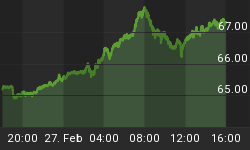If you follow the price of physical gold then I recommend - in the strongest of terms - that you read Another Volcker Moment at Hand? An Appraisal of $1500 Gold by John Hathaway of Tocqueville Asset Management L.P. - reading time 6 minutes.
In the introduction to the article, Hathaway is said to be "without question one of the most respected institutional minds in the world today regarding gold". Tocqueville Asset Management (or so I assume after reading this article) is named after Alexis de Tocqueville who is quoted in the article as saying 175 years ago that "democracy would eventually demise into a 'soft tyranny' in which the primary purpose of government would be to provide for the welfare of its citizens".
Hathaway makes the case that Paul Volcker was able in three years to interrupt, but not reverse, the downward path of the U.S.$ by instituting policies in 1979 which resulting in double-digit U.S. (and I might add Canadian) inflation rates of over 20%, accompanied by a deep three year recession. In turn, Hathaway says, that caused the price of physical gold to go into hibernation for twenty years. Hathaway then says that while in theory the U.S. Federal Government could surprise all its sceptics and provide solutions that would restore credibility to the U.S.$, he "seriously doubts" such an outcome will occur. Among other things, Hathaway suggests that a 'Volcker moment' today would result in required U.S. austerity would be necessary for 'decades' as contrasted with such austerity (or I think a far reduced measure of it) being required for only three years in the early 1980s. Assuming that such a 'Volcker moment' (which, in my view he quite rightly says, would be "bad for gold") does not happen, Hathaway says that "anything less (than a 'Volcker moment') will in all likelihood send gold to dramatic new highs".
In this commentary I have focused on Hathaway's conclusion. How he gets from where he starts to that conclusion ought, in my opinion, to be read and carefully considered by everyone who participates in the physical gold, physical silver,and gold and silver equities markets.
Eurozone
Please take the time to carefully read 'Here's What's Going To Happen When Greece Defaults' - reading time 10 minutes. The article, written by John Maudlin in his weekly e-mail Thoughts From The Frontline', reviews what Maudlin calls the ongoing 'brinksmanship' currently being played out between at least the European Commission, the European Central Bank, the International Monetary Fund, Greece, Germany and presumably others with respect to when and how Greece will deal with its Sovereign Debt issues - and importantly how that then will play out in Portugal, Spain and other Eurozone countries. My view, based on my reading of Maudlin's article and those of others, is that the Eurozone will continue to employ a postponement strategy, hoping that what I suspect is an irresolvable series of problems will somehow magically 'right themselves' without Greece and other Euro countries defaulting. Everything I read and hear tells me that the Eurozone is a freight train that is picking up speed without considering that a non-negotiable curve is just a short distance down the track.
In his article Maudlin poses this (what I take he believes is an analogous) question: "When would a wise Jew have begun making plans to leave Germany? 1933? 1934? 1938? He then recites a series of events that occurred in Germany in and after 1933, concludes that about 50% of Germany's Jewish population decided to leave Germany 'in time', and then makes what I think is a particularly incisive statement (either of his own derivation or some unquoted source): "Incident by incident, trigger point by trigger point, people see signs. Most people ignore them. 'It can't happen here'. Most times it doesn't. Sometimes it does". Something for you and I both to think seriously about, and not just with respect to the Eurozone.
Maudlin concludes that "Whatever the plan is, right now Europe looks like a very dysfunctional family. The potential for a messy divorce is quite real'." In the article he lists 17 things he thinks will occur in the event Greece defaults on its debt. As I see things, none of them are attractive in a macro-economic sense, and I suggest you take the time to read and think about them.
Could Greece be the 'finger in the dyke' whose failure triggers the next world financial crisis. I don't know enough to say definitively that will prove to be the case. However, if Greece defaults on its debt from what I have been reading and hearing I would not discount such a possibility out of hand.















